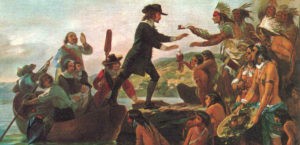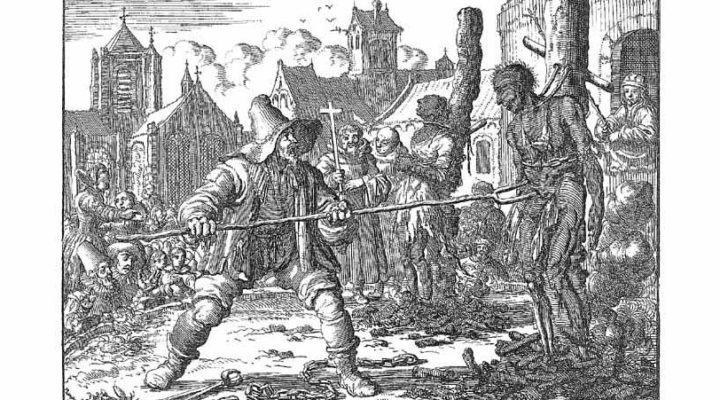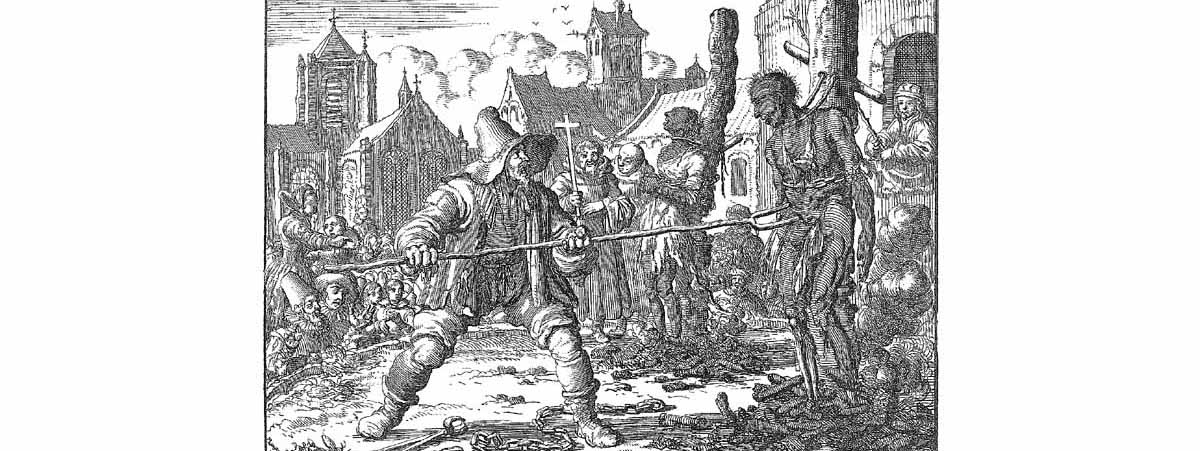I first heard the word “antidisestablishmentarianism” while competing in the spelling bee in my fourth grade class at Decatur (Texas) Elementary School. Our teacher, Mrs. Doyle, touted it then as the longest word in the English language, defined as those who opposed “separation of church and state,” a phrase I’d already learned at Decatur’s First Baptist Church.
Six years later, in Miss Howell’s sophomore history class at Fort Worth’s Paschal High School, I discovered that the word originated in 19th century England to describe those who resisted efforts to disestablish Anglicanism as the state church of the realm.

Bill Leonard
More recently, antidisestablishmentarianism hit the proverbial fan in a Nov. 16 speech by Michael Flynn, retired lieutenant general, former White House security director, forced to resign by Trump after lying to Vice President Pence about his Russia-related connections, convicted of such, then pardoned by the former president.
As my friends Brad Bull and Amanda Tyler recount in their insightful BNG pieces, Flynn, speaking at a GOP-related Reawaken America Conference in John Hagee’s San Antonio church, declared: “So, if we are going to have one nation under God, which we must, we have to have one religion, one nation under God and one religion under God.”
While Flynn did not specify the precise “one religion,” it is clear he meant Christianity, more likely a specific type of American Christianity. Amanda Tyler calls Flynn’s speech “one of the hallmarks of Christian nationalism — the emphasis of a mythical history of the United States as founded as a ‘Christian nation,’ by God’s providential hand.”
Brad Bull provides the rhetorical context for that brief antidisestablishmentarian remark as Flynn haltingly referenced Matthew 5:15, “Ye are the light of the world. A city set upon a hill cannot be hid,” to give biblical status to American exceptionalism, as cited by Americans from 17th century Puritan William Bradford to 20th century President Ronald Reagan.
Flynn’s explicit call for Christian establishmentarianism illustrates commitments from what appears to be an expanding number of churches and individuals. As more Americans distance themselves from Christian institutions, as “Protestant privilege” diminishes in the culture, and as the changing sociology of Sunday places new options and demands on families, many Christians fear that their values, rights and church memberships are being undermined by an ever-secularized state.
“Establishmentarian sentiments are nothing new in the land of the free and the home of the increasingly unchurched.”
Establishmentarian sentiments are nothing new in the land of the free and the home of the increasingly unchurched. Anglicanism was the established church in Colonial Virginia and other Southern colonies, while Puritan churches composed a de facto establishment in New England. In 1649, Maryland, a Catholic-founded colony, gave “tolerance” to all Christian citizens, but warned that those who blasphemed any member of the Holy Trinity “shall be punished with death and confiscation or forfeiture of all his or her lands and goods.”
Seventeenth century Massachusetts Puritan John Cotton declared that while the individual conscience should be free and protected, sinners who avoided church attendance, denied belief in God or blasphemed Christianity should receive punishment from civil authorities. Such punitive action was necessary to preserve society’s moral foundations as grounded in Scripture. Cotton wrote that “moral equity” required the government “to put to death any apostate, seducing idolater, or heretic who seeketh to thrust away the souls of God’s people from the Lord their God.”

“Roger Williams being received by Indians in Rhode Island, 1635,” painting by Alonzo Chappel, 1858. From Museum of Art, Rhode Island School of Design.
Roger Williams, the erstwhile Baptist, responded that such “uncivil” establishmentarian practices represented a form of “spiritual and soul rape … persecuted in all ages for the cause of conscience, and so destructive to the civil peace and welfare of all kingdoms, countries, and commonwealths.” Banished from Massachusetts, Williams purchased land from Native Americans, founding Providence in the Rhode Island colony whose 1649 charter promised: “No person within the said Colony, at any time hereafter, shall be any wise molested, punished, disquieted, or called in question, for any differences in opinion, in matters of religion.”
Establishmentarian sentiments did not disappear with the First Amendment. Flynn’s recent call for “one religion under God” was preceded by various establishmentarian-like efforts, illustrated in this representative list.
- Christian Reconstructionism, proposed by R.J. Rushdoony in the 1960s, seeks to replace democracy with a kind of theocratic system based on biblical law/literalism, advocating, among other things, stoning of blasphemers, heretics, rebellious children, adulterous couples, homosexuals and other apostates. Through elements of the homeschooling movement, Reconstructionists encourage individuals to run for office on the way to “reconstructing” American society. Reconstructionist leader Gary North declared: “So let us be blunt about it: we must use the doctrine of religious liberty to gain independence for Christian schools until we train up a generation of people who know that there is no religious neutrality, no neutral law, no neutral education, and no neutral civil government … . Then they will get busy constructing a Bible-based social, political and religious order which finally denies the religious liberty of the enemies of God.”
- States’ rights assertions led to a 2013 resolution from two North Carolina Republican state legislators appealing to the Tenth Amendment, and declaring that, “The North Carolina General Assembly asserts that the Constitution of the United States of America does not prohibit states or their subsidiaries from making laws respecting an establishment of religion.” The act was intended to allow counties to declare a particular majority faith the religious “establishment” of that region. The resolution failed, but the point was made.
- State school board actions in Texas illustrate an implicit establishmentarian approach, evident in a 2011-2012 statewide curriculum revision. Grace Chen’s article in Public School Review, “Teaching Church in Public School? Texas says Yes,” reports: “The revised curriculum, dubbed the Texas Essential Knowledge and Skills, will paint American history in a rather different light, with a definitive Christian conservative slant.”
In the Texas case, Chen provides a summary of the curriculum’s topics, including:
- Comparing the inaugural addresses of Abraham Lincoln and Jefferson Davis.
- Examining the reasons the Founding Fathers protected religious freedom and relating their intentions to the phrase, “separation of church and state.”
- Downplaying Thomas Jefferson’s role in the creation of our country (Jefferson was just one of the founding fathers who was not a professing Christian).
- Giving more attention to President Reagan and his role in American history.
- Deleting the hip-hop culture as a part of America’s recent history.
- Discussing the solvency of long-term government entitlements like Social Security and Medicare.
- Discussing the infiltration of communists into the U.S. government during the Cold War through the use of the Verona Papers.
- Including the violent philosophies of the Black Panthers in addition to the nonviolent approach of Dr. Martin Luther King Jr.
- Changing some terms, such as “capitalism” to “free-enterprise system” and “democracy” to “constitutional republic,”
Other amendments, including one that emphasized the restriction of the government from promoting one particular religion above all others, and another that included the role of Hispanics in history, were voted down by the mostly conservative school board.
“Multitudes of Americans appear to believe that some form of establishmentarianism is essential to saving the Republic and the gospel. They are wrong.”
As these sobering examples illustrate, Michael Flynn’s antidisestablishmentarian assertion of “one religion under God” is bizarre, threatening and unconstitutional, but it is no anomaly. Multitudes of Americans appear to believe that some form of establishmentarianism is essential to saving the Republic and the gospel. They are wrong.
Virginia Baptist John Leland (1754-1841) sums all this up brilliantly, then and now: “The fondness of magistrates to foster Christianity has done it more harm than all the persecutions ever did. Persecution, like a lion, tears the saints to death, but leaves Christianity pure: state establishment of religion, like a bear, hugs the saints, but corrupts Christianity, and reduces it to a level with state policy.”
Bill Leonard is founding dean and the James and Marilyn Dunn professor of Baptist studies and church history emeritus at Wake Forest University School of Divinity in Winston-Salem, N.C. He is the author or editor of 25 books. A native Texan, he lives in Winston-Salem with his wife, Candyce, and their daughter, Stephanie.
Related articles:


